

Homelessness: can the Covid-19 crisis help end rough sleeping in Australia for good? Homeless service providers say the Covid-19 crisis has created an unparalleled opportunity to end rough sleep in Australia, and are calling on state and federal governments to take immediate action.
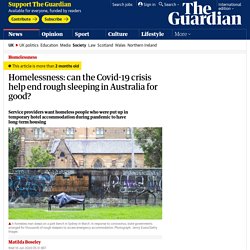
In the early weeks of the pandemic, most states and territories made the unprecedented move to get the rough sleepers off the streets and into hotel and motel accommodation in order to protect them, and the community, from the virus. More than 5,000 people were placed in accommodation across the capital cities. 2049.0 - Census of Population and Housing: Estimating homelessness, 2016. INTRODUCTIONHomelessness is not just the result of too few houses.
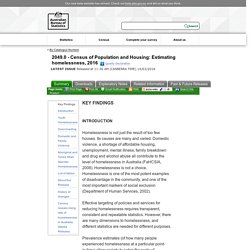
Its causes are many and varied. An age of communal and civic responsibility? This year the first day of Homelessness Week has coincided with the beginning of Stage 4 Lockdown in Melbourne, and both with Midwinter.
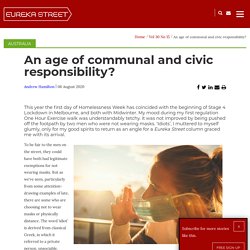
My mood during my first regulation One Hour Exercise walk was understandably tetchy. It was not improved by being pushed off the footpath by two men who were not wearing masks. ‘Idiots’, I muttered to myself glumly, only for my good spirits to return as an angle for a Eureka Street column graced me with its arrival. The DDF Homelessness Week Series - Online Events, Articles and more. Dear Friends and Supporters, Welcome to this bulletin outlining our program of content for Homelessness Week 2020!
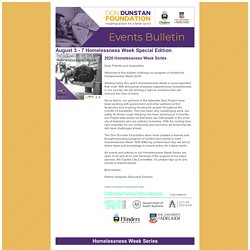
Starting today, this year's Homelessness Week is more important than ever. With thousands of people experiencing homelessness in our country, we are shining a light on solutions that can improve the lives of many. Since March, our partners in the Adelaide Zero Project have been working with government and other partners to find temporary and ongoing housing for people throughout the COVID-19 pandemic. This has been very challenging work, but safety for those rough sleeping has been paramount. (4) Adelaide Zero Project Community Briefing: Making progress during COVID 19.
The ache for home is more important than the drive for wealth. The ache for home lives in all of us.
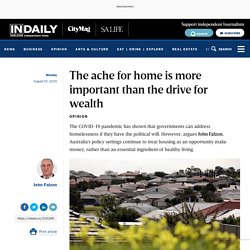
The safe place where we can go as we are and not be questioned. – Maya Angelou Home is lots of things, including, but not limited to, a roof over your head. It is a place where you know you are safe, where you can be yourself, a place from which you can connect to people, form relationships and friendships, love and be loved. Overcrowding and affordability stress: Melbourne's COVID-19 hotspots are also housing crisis hotspots. Melbourne is once again grappling with increasing COVID-19 rates.
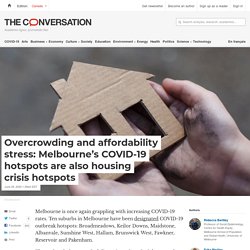
Ten suburbs in Melbourne have been designated COVID-19 outbreak hotspots: Broadmeadows, Keilor Downs, Maidstone, Albanvale, Sunshine West, Hallam, Brunswick West, Fawkner, Reservoir and Pakenham. The outbreaks have sparked discussions about lockdowns and travel restrictions for people living in these parts of Melbourne and generated intensive suburb-specific testing. The outbreaks have been attributed to family gatherings in homes and people failing to self-isolate, even after positive test results. This has occurred alongside possible breaches of infection control protocols in hotels accommodating people in quarantine – with security guards from major hotels having contracted the virus. Read more: The housing boom propelled inequality, but a coronavirus housing bust will skyrocket it. Push for national homelessness strategy. WED 29 JUL – Aged care staff under growing pressure - AM - ABC Radio. Why is housing a human right? This Monday, 10 December marks the 2018 International Human Rights Day.
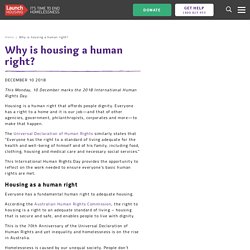
Housing is a human right that affords people dignity. Housing, homelessness and human rights. What does homelessness have to do with human rights?
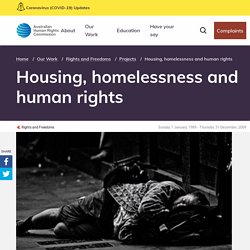
People experiencing homelessness face violations of a wide range of human rights. Access to safe and secure housing is one of the most basic human rights. However, homelessness is not just about housing. A person who is homeless may be facing violations of the right to an adequate standard of living, the right to education, the right to liberty and security of the person, the right to privacy, the right to social security, the right to freedom from discrimination, the right to vote and many more.
These human rights are protected by a number of international human rights treaties, including theInternational Covenant on Civil and Political Rights (ICCPR), the International Covenant on Economic, Social and Cultural Rights (ICESCR), and the Convention on the Rights of the Child (CRC). For more information see the Commission's discussion paper, Homelessness is a Human Rights Issue. Push for national homelessness strategy. WED 29 JUL – Aged care staff under growing pressure - AM - ABC Radio.
Professor Chris Leishman. 2018, Social Housing exit points, outcomes, and future pathways: An administrative data analysis, AHURI, $150k.
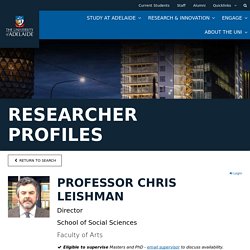
John Falzon (@JohnFalzon) / Twitter. Adelaide on target to be first city in Australia to end homelessness as volunteers connect with rough sleepers. Adelaide is one step closer to achieving its goal of ending street homelessness, after more than 200 volunteers spent the past few nights getting to know the people sleeping rough in our city in an effort to better understand their needs.
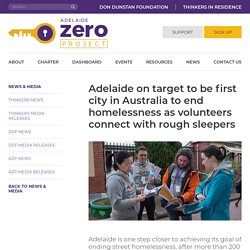
Dubbed ‘Connections Week’, the initiative is a major milestone within the Adelaide Zero Project and its goal for Adelaide to be the first Australian city to achieve and sustain Functional Zero* street homelessness. The Don Dunstan Foundation is the backbone organisation for the Adelaide Zero Project, which involves 35 partnering organisations including inner city homelessness services, Principal Partner, Bendigo Bank, state government, City of Adelaide, University of Adelaide and Flinders University. The city’s first Connections Week concludes today 17 May and marked the start of the implementation phase of the Adelaide Zero Project, led by the Don Dunstan Foundation. “Ending functional homelessness in Adelaide’s CBD is possible,” Mr Sandeman said. Homelessness Australia. Homelessness SA – The Voice For All South Australian's Experiencing Homelessness. Australian Charities and Not-for-profits Commission. Homelessness Week Series.
Professor Chris Leishman. We know how to solve homelessness in Adelaide: why haven't we? While it may seem insurmountable, the issue of homelessness is not only solvable, but we know how to solve it. It takes a strong goal, it takes strong partnerships, and it takes strong leadership. On my visit last year, I learned quickly that Adelaide had all of the components necessary to make real change. I learned that Adelaide was willing and prepared to end rough sleeping. Why, then, one year later, are there still 141 people sleeping rough in the city of Adelaide? It’s time for the city of Adelaide to reduce barriers that keep people on the street, to loosen up the availability of existing affordable housing and to build and strengthen the backbone support for the Adelaide Zero Project.
Spending time with an outreach team last year alerted me to the fact that many people sleeping rough had no choice but to stay on the streets as the barriers to shelter and housing were great. HRA homeless. Housing, homelessness and human rights. What does homelessness have to do with human rights? Homelessness services Overview. Homelessness and homelessness services. Homelessness services Across Australia, SHS agencies provide services aimed at prevention and early intervention, crisis and post crisis assistance to support people experiencing or at risk of homelessness. The agencies receive government funding to deliver accommodation-related and personal services.
They vary in size and in the types of assistance provided. As noted, SHS agencies provide assistance to both people experiencing homelessness and people at risk of homelessness. Each year (since the start of the collection in 2011–12), SHS have assisted a greater proportion of clients at risk of homelessness than those experiencing homelessness. How many people received assistance? SHS agencies supported more than 1.2 million Australians between 2011–12 and 2018–19 (AIHW 2019). StreetSmart - Donate and Take Action Against Homelessness - StreetSmart Australia.
Three different experiences of homelessness in Australia. It’s hard to imagine that in Australia—one of the wealthiest countries in the world—homelessness is a daily struggle for over 116,000 vulnerable individuals that don’t have a safe place to call home.1. Reimagining our housing. Over the course of my life, I have lived in 38 different houses. People often find this fact a little shocking, but it doesn’t reflect a history of hardship or lack of choice.
Indeed, it might be best described as the result of an excess of choice. If Australia really wants to tackle mental health after coronavirus, we must take action on homelessness. The COVID-19 pandemic has opened fault lines in social, economic and health-care policy in Australia. One area in which all three converge is homelessness. It’s almost impossible to practise self-isolation and good hygiene if you’re living on the streets or moving from place to place. This puts homeless people at higher risk of both catching the disease and transmitting it to others. Tracking the rise of room sharing and overcrowding, and what it means for housing in Australia. The proportion of households experiencing rental stress is on the rise across Australia’s major cities. High rental prices have been driving an increase in shared housing. The most extreme form of this is “shared room” housing – where residents share a bedroom or partitioned living space (such as lounge room or garage) with a number of unrelated adults.
Official statistics, such as those collected by the Australian Bureau of Statistics, fail to accurately record room sharing. Public knowledge is limited to anecdotal stories or periodic media coverage of tragic outcomes of living in shared room housing – such as a 2012 apartment fire that led to the death of an international student in Bankstown, Sydney.
Homelessness and overcrowding expose us all to coronavirus. Here's what we can do to stop the spread. Staying home and social distancing are now essential to control the spread of COVID-19. Suitable accommodation for quarantine and isolation are critical, but Australia’s broken housing system leaves us all exposed. By now, almost every Australian will have thought about the coronavirus pandemic in terms of their own housing. For many home owners, this is an economic concern. They are dangerously in debt after a 20-year housing boom. Housing.